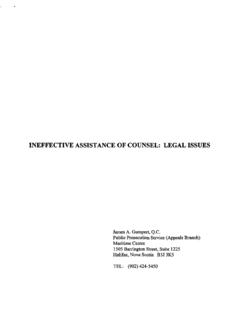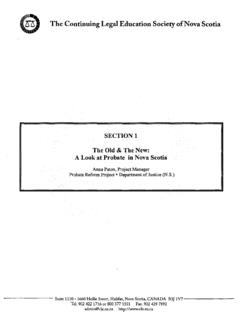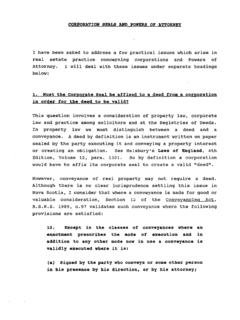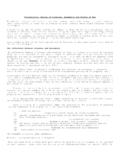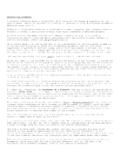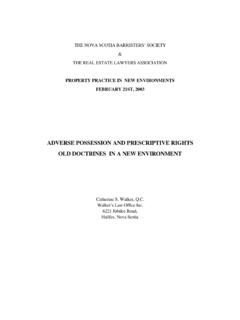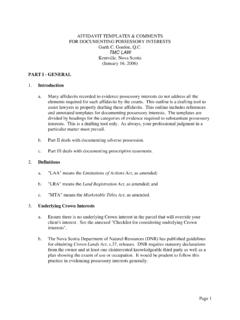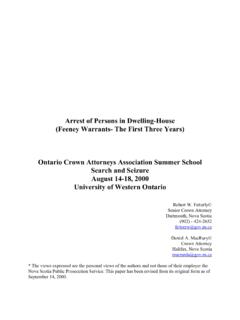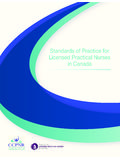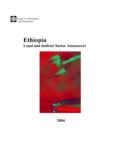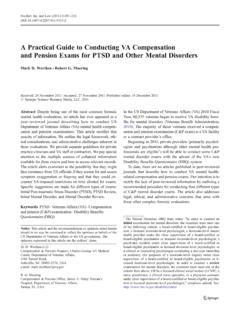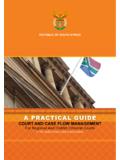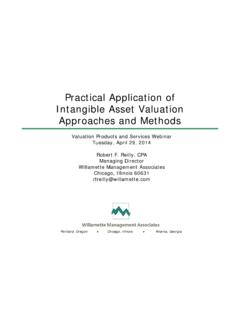Transcription of Executors' Duty to Account Legal and Practical …
1 Executors' Duty to account - Legal and Practical Perspectives Gregg W. Knudsen Will and Estate Planning Officer Scotiatrust Suite 900 1801 Hollis Street Halifax, NS, B3J 3N4 Telephone: (902) 420-2296 Fax: (902) 420-7119 I. Introduction Recent changes to Regulation 47(1) of the Barristers and Solicitors Act expand the Trust account reporting requirements of the membership of the Nova Scotia Barristers' Society. These changes were passed to respond to a number of transgressions widely reported in the local press and various Society publications. With this new pending responsibility, it is an appropriate time to review our current obligations as proctors and executors with respect to accounting. Accordingly, a review of the duty of an executor to account is in order. Rather than dealing with the new regulation, this paper is a review of the current obligations. Firstly, I will provide a review of the relationship between anexecutor's duties at common law and the duty to account .
2 I will then discuss the process of passing accounts under the current Probate Act. Finally, I will conclude with remarks that will assist you and your clients in tracking your efforts and, hopefully, keep risk management concerns to a minimum. Therefore, my comments apply equally to the proctor of an estate, a named sole or co-executor or a corporate executor. II. Executors' Dutv to account Common Law It is well established that an executor or administrator of an estate has duties akin to that of a trustee and, therefore, he/she is subject to the various common law duties applicable to a fiduciary.' The executor of an estate owes a fiduciary responsibility to the beneficiaries of an estate and to its lawful creditors (until the latter's claims are satisfied). There is considerable academic commentary and case law on the various duties, a meaningful review of which is beyond the scope of this paper.
3 In summary, they include the obligation to protect the assets entrusted to him, to distribute the property according to law and the duty to act in the best interests of the beneficiaries and not to obtain secret profits from his office. Inherent in all of this is the duty to be accountable for these assets. The authors of Widdifield -Law and Practice Relating to Executors Accounts quotes the old English case of Freeman v. Fairlie, 3. Mer. 43: "It is the bounden duty of an executor, or other trustee, to keep clear and distinct accounts of the property which he is bound to administer." Further, this duty includes a corresponding right of the beneficiaries to demand to review accounts of the executor at any time. 1 Re: Speight (1833), 22 Ch. D. 727 ( ); See also Waters' Law a/Trusts in Canada (2d ed.), pp. 31-42. On a more concrete level, David A. Howlett provides a succinct commentary on executors' duties in his book, Estate Matters in Atlantic Canada2 Ofthose principles, the following are the most relevant to our discussions: "3.
4 Within a reasonable time, convert (sell) assets which require conversion at the best possible price, and bring the assets into a proper state of investment .. 5. Refrain from misusing the estate property, or from commingling it with one's own funds. Otherwise, the personal representative's funds may be forfeited to the estate, except to the extent that the representative is able to prove they are his own separate assets .. 7. Distribute the assets properly .. 8. Maintain proper accounts and records .. " Therefore, an executor's duty to account plays a crucial role in reinforcing the other fiduciary duties imposed by the common law as it, theoretically, provides an empirical illustration of how the executor has performed those duties. Statutory Position There are various statutory provisions which underscore the importance of a duty to account . The Nova Scotia Probate Act requires an executor to file his accounts at least ten days before the time fixed for the Closing3.
5 Once the accounts are approved and the Estate is closed, this is conclusive evidence of the following: (a) that the items in such account for money paid to creditors, to legatees, to the next of kin and for necessary expenses, are correct; (b) that such executor or administrator has been charged all the interest for money received by him and embraced in his account for which he was legally accountable; (c) that the money stated in such account as collected was all that was collectable on the debts mentioned in such account at the time of the allowance thereof. 4 Further, section 56 of the Trustee Act5 is also relevant: 2 See pp. 128-130 3 1989. c. 359. 4 Probate Act, s. 79 5 1989 c. 479 2 "Where an executor or administrator has given such or like notice as, in the opinion of the court in which such executor or administrator is sought to be charged, would be sufficient in the Supreme Court in an administration action, or in a court of probate, for creditors and others to send in to the executor or administrator their claims against the estate of the testator or intestate, such executor or administrator shall, at the expiration of the time named in the said notices, or the last of the said notices for sending such claims, be at liberty to distribute the assets of the testator or intestate, or any part thereof, having regard to the claims of which such executor or administrator has then notice.
6 And shall not be liable for the assets or any part thereof so distributed to any person of whose claim such executor or administrator did not have notice at the time of distribution of the said assets or a part thereof, as the case may be, but nothing in this Section contained shall prejudice the right of any creditor or claimant to follow the assets or any part thereof into the hands of the person or persons who have received the same respectively. (emphasis mine) While there has been considerable debate over the necessity to formally close every estate6, it is clear that the act of doing so provides a measure of protection to the executor for the receipt and disbursement of funds up to the date of the Final Decree. At a minimum, these and other statutory provisions further reinforce the importance of an executor's duty to account . Furthermore, notwithstanding one's opinion on the requirement to close probate, it is well settled that an executor has a duty to account to those parties interested in an estate even if one chooses not to probate the estate at a1l7.
7 III. Dealing with the Assets An executor's account is merely a summary of all transactions involving the assets of an estate. Hence, it is useful to review some of the issues involved in preparing an inventory and their impact on the final accounting. Asset Gathering The executor is responsible for the administration of all assets to which the testator was entitled at the time of hislher death. Proof of title and ownership is, quite often, a question of fact readily ascertainable from the circumstances. That being said, it is not difficult to think of circumstances where entitlement is very much at issue. There are other types of assets whose "ownership" during the testator's lifetime may be undisputed but their status as estate assets is not as clear. Assets such as life insurance, RRSPs and RRIFs and 6 See article by LJ. Hayes, QC, "Estate Administration Overview", presentation given at CLE, October 1986; Vincent P.
8 Allen, QC, Nova Scotia Probate Law and Procedure, pp. 44-45 also Law Reform Commission of Nova Scotia: Final Report Probate Reform in Nova Scotia, pp. 71-73; 7 For a general review, see MacDonald. Sheard and Hull-Probate Practice (4'h ed), pp. 335-336 and Waters, supra Note 1 at pp. 871-876.. 3 jointly held assets are becoming more common due, in part, to the growing popularity of probate fee avoidance as an estate planning strategy. Beneficiary Designations In life insurance policies, pension plans and registered investment plans, the annuitant/insured is, usually, the "owner" of the policy or plan. If a person makes a beneficiary designation, the assets pass to the named beneficiary as a consequence of the owner's death. So long as the estate is solvent and it is not the named beneficiary, the assets pass outside of the estate and no probate fees or executor's commission are payable on these assets8.
9 In that case, the executor is not responsible to the beneficiary for the proceeds unless, presumably, he has expressly or by his actions assumed responsibility for them. If the estate is the named beneficiary then the assets form part of the estate and must be taken into account and distributed according to the will (or to the deceased's heirs, in case of an intestacy). Therefore, it is important to check the latest will and/or beneficiary designation to determine the last named beneficiary. In considering insolvent estates, there have been many cases dealing with the claims of a deceased's creditors when the deceased's assets include life insurance, RRSPs or annuities9. In general, the rule seems to be that if an asset fits within the broad definition of "life insurance" as set out in the Insurance ActiO, then the proceeds pass to the named beneficiarr pursuant to the insurance contract and are not subject to the claims of hislher creditors I.
10 Further, section of the Income Tax Act provides that a named beneficiary of an RRSP/RRIF (other than a spouse, dependant child or grandchild) is jointly and severally liable with the deceased's estate for the tax payable. The deceased's estate is required to pay the income tax arising from the death ofthe annuitantl2. However, if the estate is unable to pay the income tax burden, the recipient is liable for the tax resulting from the RRSP/RRlF. Therefore, in preparing an accounting, it is important to remember the impact of a beneficiary designation to determine if that asset forms part of the estate. Joint Accounts Many clients have cash or investments held injoint accounts. In some cases, it is intended to serve as a shared resource, such as a husband and wife, while at other times it is a matter of convenience, such as a parent and a child. Many people believe that joint accounts described as "joint with right of survivorship" always pass to the survivor and do not form part of the deceased's estate.
